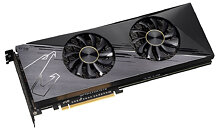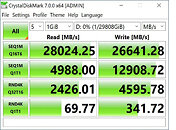Friday, July 2nd 2021

GIGABYTE Announces AORUS Xtreme Gen4 AIC SSD: 28 GB/s Transfer Rate
GIGABYTE Technology, one of the top global manufacturers of motherboards, graphics cards, and hardware solutions, today announced the AORUS XTREME Gen4 AIC SSD with 28 GB/s ultra-fast access speed. This high capacity and extreme performance SSD builds in eight 4 TB 2nd generation PCIe 4.0 NVMe M.2 SSDs with PHISON PS5018-E18 controller, AORUS XTREME Gen4 AIC SSD offers ultra-high transfer bandwidth and superior access performance through RAID configuration.
The AORUS Xtreme Gen4 AIC SSD features ultimate thermal design with large aluminium finned heatsink, M.2 baseplate for passive cooling, 10 temperature sensors and active dual-fan heat dissipation design, while the exclusive SSD Tool Box offers users real-time status and temperature monitoring of SSDs. GIGABYTE AORUS Storage Manager allows users to configure a RAID array with a single click and 3-phase fan speed adjustment, which enabling AORUS XTREME Gen4 AIC SSD to keep cool and performing at a high level. It promises a non-throttling experience for users who phase for high capacity and breakthrough performance."With advancements in both hardware and flash memory, the SSD performance jump up to a new level, however there is still a gap from the uppermost 32 GB/s transmission bandwidth of PCIe 4.0 x16…" said Jackson Hsu, Director of the GIGABYTE Channel Solutions Product Development Division. "GIGABYTE has played a leading role in the development and production of PCIe 4.0 SSDs. After the recent launch of AORUS Gen4 7000s Prem. SSD, GIGABYTE has further released AORUS XTREME Gen4 AIC SSD to approach the maximum PCIe 4.0 bandwidth with 28 GB/s transfer speed. The dual fan thermal design enables optimized performance under low temperature, while the large capacity of 32 TB allows users to store more data and reduce the risk of insufficient storage space."
AORUS XTREME Gen4 AIC SSD features high-quality, hairline brushed baseplate with a curved edge design of the outlook, and Integrates 8 sets of 4 TB AORUS Gen4 7000s level SSDs with PHISON PS5018-E18 controllers. By the RAID configuration, it not only provides a large capacity of up to 32 TB, but also increases the sequential read speed to 28 GB/s, which surpass the AORUS Gen4 7000s SSD up to 4 times speed and become the highest performance storage device among all consumer SSDs in the market.
In order to avoid the throttling by overheating under high-speed operation and even data damage or loss, AORUS XTREME Gen4 AIC SSD is designed with large aluminium finned heatsink, M.2 baseplate, and giant thermal back plate to effectively dissipate the heat generated by the SSD in high-speed operation. Meanwhile the system air flow, the large air volume of the dual fans, and the thermal vent on the baffle plate create active heat dissipation to promise high performance of the SSD under ultra-high speed operation without throttling.
AORUS XTREME Gen4 AIC SSD comes with 10 thermal sensors, which enable users to monitor the temperatures and real-time status of eight 4 TB M.2 SSDs through GIGABYTE's exclusive SSD Tool Box. Furthermore, AORUS Storage Manager comes with three fan operating modes of fan speed adjustment for silent and effective cooling. Users can configure a RAID 0 Array with a single click for impressive storage performance as well!
AORUS XTREME Gen4 AIC SSD supports PCIe 4.0 and is backward compatible with PCIe Gen3, which can perfectly unleash the supreme storage performance of the PCIe 4.0 or PCIe Gen3 platform! Enhanced by GIGABYTE motherboards with PCIe 4.0 supportive hardware design, users can now enjoy the improved data transfer volume of PCIe storage, unleashed hidden performance of PC peripherals, limit-breaking transfer speed, and the ultimate performance from 2nd generation PCIe 4.0.
The AORUS Xtreme Gen4 AIC SSD features ultimate thermal design with large aluminium finned heatsink, M.2 baseplate for passive cooling, 10 temperature sensors and active dual-fan heat dissipation design, while the exclusive SSD Tool Box offers users real-time status and temperature monitoring of SSDs. GIGABYTE AORUS Storage Manager allows users to configure a RAID array with a single click and 3-phase fan speed adjustment, which enabling AORUS XTREME Gen4 AIC SSD to keep cool and performing at a high level. It promises a non-throttling experience for users who phase for high capacity and breakthrough performance."With advancements in both hardware and flash memory, the SSD performance jump up to a new level, however there is still a gap from the uppermost 32 GB/s transmission bandwidth of PCIe 4.0 x16…" said Jackson Hsu, Director of the GIGABYTE Channel Solutions Product Development Division. "GIGABYTE has played a leading role in the development and production of PCIe 4.0 SSDs. After the recent launch of AORUS Gen4 7000s Prem. SSD, GIGABYTE has further released AORUS XTREME Gen4 AIC SSD to approach the maximum PCIe 4.0 bandwidth with 28 GB/s transfer speed. The dual fan thermal design enables optimized performance under low temperature, while the large capacity of 32 TB allows users to store more data and reduce the risk of insufficient storage space."
AORUS XTREME Gen4 AIC SSD features high-quality, hairline brushed baseplate with a curved edge design of the outlook, and Integrates 8 sets of 4 TB AORUS Gen4 7000s level SSDs with PHISON PS5018-E18 controllers. By the RAID configuration, it not only provides a large capacity of up to 32 TB, but also increases the sequential read speed to 28 GB/s, which surpass the AORUS Gen4 7000s SSD up to 4 times speed and become the highest performance storage device among all consumer SSDs in the market.
In order to avoid the throttling by overheating under high-speed operation and even data damage or loss, AORUS XTREME Gen4 AIC SSD is designed with large aluminium finned heatsink, M.2 baseplate, and giant thermal back plate to effectively dissipate the heat generated by the SSD in high-speed operation. Meanwhile the system air flow, the large air volume of the dual fans, and the thermal vent on the baffle plate create active heat dissipation to promise high performance of the SSD under ultra-high speed operation without throttling.
AORUS XTREME Gen4 AIC SSD comes with 10 thermal sensors, which enable users to monitor the temperatures and real-time status of eight 4 TB M.2 SSDs through GIGABYTE's exclusive SSD Tool Box. Furthermore, AORUS Storage Manager comes with three fan operating modes of fan speed adjustment for silent and effective cooling. Users can configure a RAID 0 Array with a single click for impressive storage performance as well!
AORUS XTREME Gen4 AIC SSD supports PCIe 4.0 and is backward compatible with PCIe Gen3, which can perfectly unleash the supreme storage performance of the PCIe 4.0 or PCIe Gen3 platform! Enhanced by GIGABYTE motherboards with PCIe 4.0 supportive hardware design, users can now enjoy the improved data transfer volume of PCIe storage, unleashed hidden performance of PC peripherals, limit-breaking transfer speed, and the ultimate performance from 2nd generation PCIe 4.0.


21 Comments on GIGABYTE Announces AORUS Xtreme Gen4 AIC SSD: 28 GB/s Transfer Rate
Yes yes the ntfs, or windows 10, or weak CPUs, or phison controller, or security check for viruses, or combined factors are guilty but, but, but this is very inadequate in 2021 for some expensive and newest devices!
Nice job for a ubber expensive drive like this :kookoo:
One more variant but maybe light off topic:
Which is better, static or dynamic loading?
Databases, photoshop and video editors will be a good use case for this.
There is gigantic price premium on any such card fully equipped and as such it's terrible value, but empty - Just take my money. :respect:
8x7GB/sec = 56GB read.
more trash products.
www.bhphotovideo.com/c/product/1604479-REG/highpoint_ssd7540_pcie_4_0_x16_8_port.html